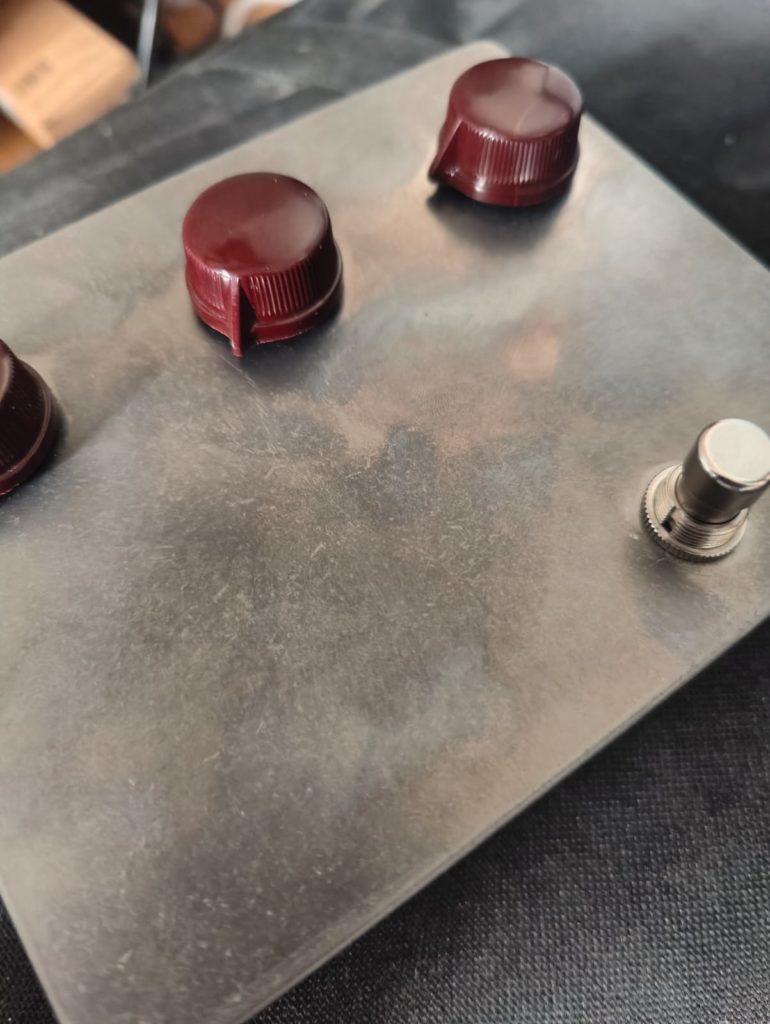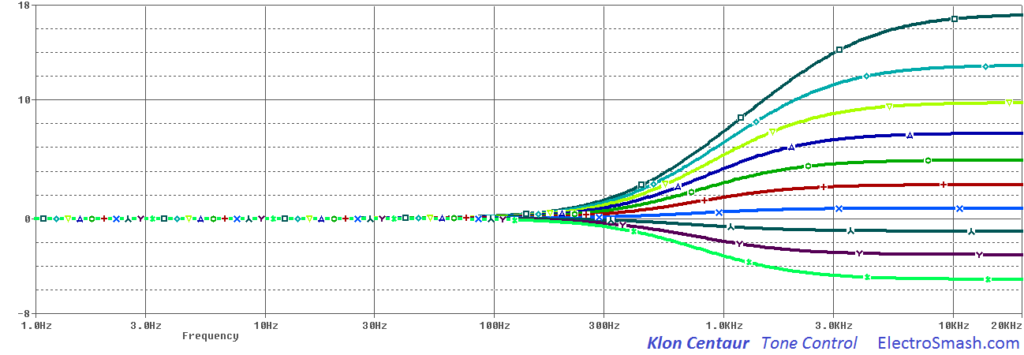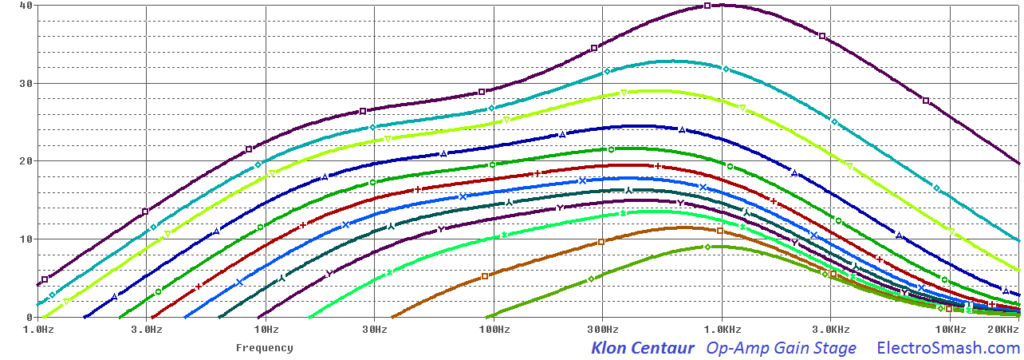Piedmont Custom Electronics PCE Aluminum Falcon (Klon Centaur clone)

It does not take a name, a graphic or any writing at all to tell you what to expect. Thanks to the iconic design of Bill Finnegan, everyone who knows a bit about guitar pedals will know that this is a clone of a Klon (or a Klone). This one was made by Piedmont Custom Electronics, PCE-FX. It’s called Aluminum Falcon.
This is hopefully a reference to the Robot Chicken Star Wars parody – because when you look up Aluminum Falcon on urbandictionary.com, the term refers to the impromptu creation of a prophylactic sheath, using kitchen materials (tin foil). Researching this pedal yields a few ‘interesting’ reads about the business practices of Piedmont Custom Electronics and David Danielson, the creator of this pedal. I can’t really tell if PCE-FX is still in business, as their website is not up any more, but the internet seems to hold the opinion that it’s not the best of ideas to send money their way if there is no current stock.
This particular Aluminum Falcon is an anniversary edition, a limited run of 30 pedals where every step was done by hand, including the etching and drilling of the PCB.
For the creation of this pedal, several NOS components were sourced, including “a certain mythical germanium clipping diode that contains the tears of neutered Unicorns”1.
So this is a pedal that seems to be a well loved clone of a Klon, something that comes really really close to the original – and which has become increasingly difficult to find, just like the pedal it’s based on.
Checking on Reverb confirms that these sell well above the MSRP of $300.
Quick refresh about what a Klon is and what it does:
Designed in 1994 by Bill Finnegan, this is a bit of a weird circuit, since it is mainly used by guitar players to push their amp into a creamy sound – but what it does is hard clipping a germanium diode, which is not usually associated with the word ‘creamy’.
Let’s have a look at the frequency response of the Klon’s Tone control:

The tone knob is not a passive treble cut as one might assume – but an active filter, capable of boosting a lot and cutting a little. It is shelving, but starts as low as 250Hz. While this might be the wet dream of a lead guitarist, as a bassist one looks at this graph and realizes that the tone knob has to be handled with caution. Even if the pedal does not cut any lows – when it boosts everything else, it will sound like the lows are cut. This is made somewhat worse by the impact the gain knob has on the frequency response:

There’s a solid bump in the 1kHz range when you ride the gain too high, which will further emphasize a perceived loss of low end.
While both graphs indicate that it’s a bad idea to dime everything, they also indicate that there is a certain range where a Klon pedal can absolutely work for bass.
Plugging it in, I find there totally is some range to the pedal with somewhat of a neutral sound. As long as you keep the gain below 2 o’clock and don’t go nuts on the treble knob, you can have a sound that is considerably brighter than your clean sound, but it does not feel like you’re thinning out down low.
Indeed, having played two K-Types not too long ago (the Wampler Tumnus and the Mosky Golden Horse), I feel more reminded of the Wampler than the Mosky. I liked the Wampler a lot more because it left more of the low end intact and the Aluminum Falcon feels like it does the same.
Just for reference, though: When I A/B the Aluminum Falcon and the Verellen Meatsmoke, swapping from the ‘smoke to the Falcon , the Falcon suddenly sounds and feels like a tin can on a string, being dragged by a car. That is not happening when playing that pedal alone. That beast of Verellen’s making is just sounding so fat it reminds me of internet pictures of those Americans in Wal Mart who drive around in a small but very sturdy electric vehicle. Compared to that, everything sounds skinny.
However, once again, we get a hard clipping germanium diode (once again, two things I don’t really enjoy) that is somehow executed so smooth that I mind neither germanium nor hard clipping. It leaves the timbre and natural tone of the connected instrument vastly intact and adds just a bit of stubble to the chin.
Having a Verellen Meatsmoke at my disposal, which basically is the front half of a tube amp, I can give the Aluminum Falcon a run for its money in its desired ecosystem. The Klon is a pedal that is meant to drive the front end of a tube amp.
When I set the Meatsmoke to the edge of breakup so it stays clean with normal playing but plucking hard yields audible fizz, then the Aluminum Falcon will do it’s job and give the Meatsmoke a completely different voice. Where the sound of the Meatsmoke ususally is best described as organic, the addition of the Aluminum Falcon gives the drive a metallic note, the attack gets a lot harsher and the result is something completely different than merely hitting the front of the Meatsmoke with a boosted signal.
It is a tone neither device is capable of on its own.
The organic sound of the Meatsmoke gains an edge with a ring to it, like being raked across the ear with a set of aluminum talons.
You can clearly see that this device was made to drive the front end of a tube amp, but of course it does work on its own. As a bassist, you won’t really be able to enjoy the entire travel of all the knobs because it gets too boosted up top, creating the feeling of the low end dropping out, but if you don’t mindlessly dime the knobs, there is the ability to add a little something to your sound, a barely there drive with a gentle, not too harsh top end boost. It can also get into solid overdrive territory, where it sounds surprisingly smooth for a germanium hard clipping device. It reacts to the touch and plays well.
All in all, I’d not recommend spending this much cash on a Klone that has had no optimization for bass use, there are better devices out there if you’re in the market to Klon up your bass sound — But if you happen to sit on one of these and want it to pull double duty for bass and guitar, go ahead.
- Since I could not find any official sources, I took the next best thing, which is the website merchmountain.com. The quote is taken from the description of the pedal and it seems like it was penned by the creator of the pedal. ↩︎